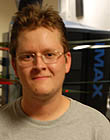|
|
 
|
|
Author
|
Topic: Perfect Digital 3D ... not like in the 50's !!!!
|
Julio Roberto
Jedi Master Film Handler
Posts: 938
From: Madrid, Madrid, Spain
Registered: Oct 2008
|
 posted 02-11-2009 01:54 PM
posted 02-11-2009 01:54 PM



http://www.avsforum.com/avs-vb/showthread.php?t=1106374
That thread shows a picture of people wearing their RealD 3D glasses upside down in a movie theater and discusses how a lot of theaters hooked the "wrong" feed cable order to their system, producing reversed 3D, during the recent NBA 3D broadcast. It seems it was plugged-in wrong in 3 out of 4 theaters that carried it.
This happened occassionaly during the 3D of the 80's when a projectionist was not careful enough and framed the print half-frame off.
I guess it may have briefly happened sometime in the 50's in the left and right eye dual prints got swapped or misslabeled by mistake.
If the public wouldn't have figured out that they needed to wear their glasses upside-down, they would've been left with a really bad impression of the Real-D system and a headache from watching pseudoscopic pictures for several hours.
The effect, for those wondering, is that "everything would be in reverse depth-wise". If, you nose would be "into your head" instead of sticking out of it. Since the brain doesn't accept that this is possible, it tries to fight the depth cue and produce an image that the nose is sticking out of it. So the closer things are to the viewer ... the farther apart they look ... a total mess.
Welcome to the NEW, perfect, all digital, "even a monkey can do it", trouble free 3D of the 2010's ...
And don't forget the improved glasses! (whith the extra ghosting ...)
quote:
This actually happens all too easy. I was involved in several installs for "Chicken Little". I was setting up the servers, Christie and Real D hired out people to set up the projectors, and when I did the final checks, 4 out of 5 I did had the eyes flipped. In those setups, there were 4 places the two streams could get crossed. Obviously, there are the two HD-SDI cables out of the server, and into the projector, that is two places. Then the projector 3D setup menu has a pick box for how the data from the dual links are to be used. The labels were very cryptic, and A-L/B-R was right before A-R/B-L. Then there is a tiny toggle switch on the back of the Z-Screen controller that just says "Phase" that will invert the left/right signal from the projector. There is even a fifth place, in the projector menus again, GPO output polarity, High=left or High=right. And a full week into the run I went into another theatre, and the projectionist complained that even though it looked okay in the theatre, you can't see any depth from the projection room. You guessed it, the eyes were flipped. I just hit the switch on the Real-D box and oh-my! 3D even from the booth. I know Disney and Paramount both included a test chart with the latest 3D shows for proper framing that also have boxes labled for left eye and right eye with instructions to test it before the shows. Hopefully that will reduce errors like this on 3D features. The live feed throws a whole different set of potential places for the flip to occur. I was not involved with any of the live shows, so I have no idea how the dual streams were packaged. They do need to stay in perfect sync, so it is easier to use a single packaged stream with the data for both eyes. This can also cause issues though, if not done right. There was cinema server system that used a 48 fps JPEG2K file for 3D with the image data alternating left eye/right eye. There evidently was no hard flag (or the server igored it) to say which frame was which eye. It just started first frame left, and assumed it would stay in sync. Guess what?? The player would occasionally drop a frame. This was rare, maybe once each day of 5 shows, at the worst. But... each time it dropped a frame, the eyes would not only flip, but you would be seeing non time coherent frames when they were flipped as well. Frame 453 right eye going to the left eye, and frame 454 left eye going to right eye. OUCH!! This should now be fixed with a hard flag in the data, and software in the server to keep coherent frames and correct eyes straight.
Perfect, trouble free, new and improved digital 3D indeed. Coming soon to a theater near you. ![[sex]](graemlins/sex.gif)
| IP: Logged
|
|
|
|
Julio Roberto
Jedi Master Film Handler
Posts: 938
From: Madrid, Madrid, Spain
Registered: Oct 2008
|
 posted 02-11-2009 02:50 PM
posted 02-11-2009 02:50 PM



quote: Mike Olpin
From what I understand, the effect would have the same dimensionality. Things coming into forward space would still appear in froward space.
Nope.
Things that appear to come forward in space (i.e. to be closer or in front of other things) actually appear to be behind or move away from you. Since this is obviously "impossible" (i.e. you couldn't be seeing a person in front of other person while actually being "behind" that person, as the first person would occlude the second one from view, it's just impossible in nature), your brain tries to adjust for that and make it "ok" and show the person in front to be in front but with everything looking really weird and certainly not like that person is "coming forward" but as much back as possible without breaking universal logic.
If there is no oclussion, you indeed see foreground objects behind background objects. Like if you get a block of wood and carve in an scene but always carving away from you. It's hard to explain if you have never experienced it, since there is nothing like it in real life. If you go to a 3D movie, flip your glasses upside down and look at the contours of the things. They "carve in" instead of out.
Your eyes can not "diverge" (not much, anyway, certainly not as much as they can converge). Besides, the stereopsis that lies in the retinal rivalry is embedded in the film ... remember each eye is getting the WRONG image.
Convergence is not what gives stereopsis. It's only an additional, very minor, clue and an aid to fuse the different images so their retinal rivalry is lower. It's the (spatial) difference in the images that gives (99% of) the stereo effect, and that relative difference is fixed in the image at the time of photography.
You can change the relationship of an entire scene by projecting each image separate or adjusting it in post, but you can not change the relative relationship in space between objects within the scene.
I once projected the 3D movie APE in the 80's and the brand-new (looking) print turned pseudoscopic at some point during a scene where it was hard to tell where it happened (some giant ape was fighting something in the far background against hills). I had to half-frame skip during projection. And for the sake of it, I couldn't figure out the exact place where the movie went pseudoscopic (half frame missing) on that one for 3 more projections.
I had that problem with some 2 or so more films, but those were obvious bad splices and were easy to locate and fix.
| IP: Logged
|
|
|
|
Julio Roberto
Jedi Master Film Handler
Posts: 938
From: Madrid, Madrid, Spain
Registered: Oct 2008
|
 posted 02-11-2009 03:09 PM
posted 02-11-2009 03:09 PM



quote: David Zylstra
It was NOT the theatre personnel who hooked the wrong "feed" cable into the system
Of course, never my intention to blame anyone. I did say, quote, "It seems ..." plus I was just referring to what was being said in that other thread.
And, besides, obviously some technical assistant people were responsable for this. I guess your usual misscommunication between whoever was feeding the signal and the people in charge of setting up the projection/server.
Another bad on DCI/SMPTE, though, as they should insist on servers labelling the output to projectors and projectors "labelling" or "adhering" to the phase for instruments like the Zscreen or the Dolby or Master Image wheels.
quote: David Zylstra
To my eyes the effect of it being backwards seemed to simply flatten the 3D effect to 2D, but I still seemed to perceive some semblance of depth but it felt really funny. Our staff noticed the issue immediately and alerted all in the crowd to flip their glasses until the root cause was found out and fixed.
Yeah. People percieve this effect differently, as it is subjective. Your eyes are telling your brain that people's noses are "carving in" instead of "sticking out". Your brain knows this is not possible, and tries to make it look "out" again. The net result, you settle for flat (i.e. 2D image ... the nose is neither sticking in nor sticking out) but with some weird feeling about it, specially if you look at the contours, since they are reversed.
| IP: Logged
|
|
|
|
|
|
|
|
|
|
All times are Central (GMT -6:00)
|
|
Powered by Infopop Corporation
UBB.classicTM
6.3.1.2
The Film-Tech Forums are designed for various members related to the cinema industry to express their opinions, viewpoints and testimonials on various products, services and events based upon speculation, personal knowledge and factual information through use, therefore all views represented here allow no liability upon the publishers of this web site and the owners of said views assume no liability for any ill will resulting from these postings. The posts made here are for educational as well as entertainment purposes and as such anyone viewing this portion of the website must accept these views as statements of the author of that opinion
and agrees to release the authors from any and all liability.
|

 Home
Home
 Products
Products
 Store
Store
 Forum
Forum
 Warehouse
Warehouse
 Contact Us
Contact Us




 Printer-friendly view of this topic
Printer-friendly view of this topic



![[sex]](graemlins/sex.gif)



![[beer]](graemlins/beer.gif)



